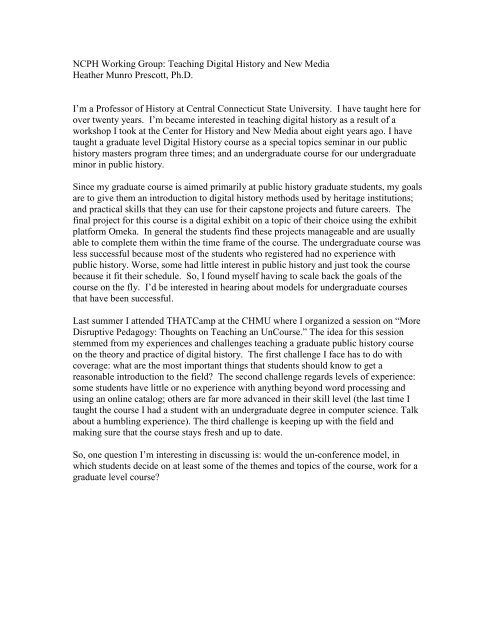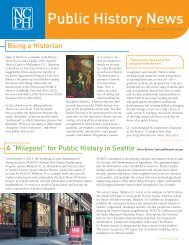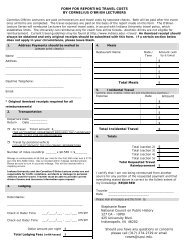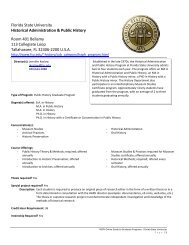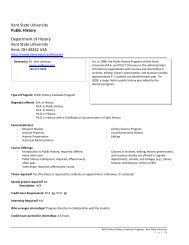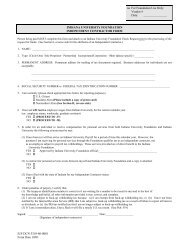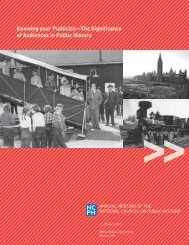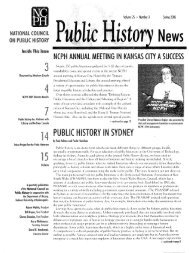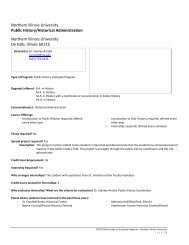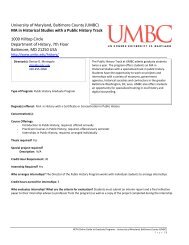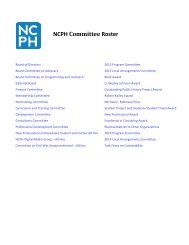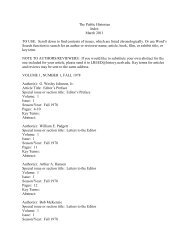Case Statement - National Council on Public History
Case Statement - National Council on Public History
Case Statement - National Council on Public History
Create successful ePaper yourself
Turn your PDF publications into a flip-book with our unique Google optimized e-Paper software.
NCPH Working Group: Teaching Digital <strong>History</strong> and New Media<br />
Heather Munro Prescott, Ph.D.<br />
I’m a Professor of <strong>History</strong> at Central C<strong>on</strong>necticut State University. I have taught here for<br />
over twenty years. I’m became interested in teaching digital history as a result of a<br />
workshop I took at the Center for <strong>History</strong> and New Media about eight years ago. I have<br />
taught a graduate level Digital <strong>History</strong> course as a special topics seminar in our public<br />
history masters program three times; and an undergraduate course for our undergraduate<br />
minor in public history.<br />
Since my graduate course is aimed primarily at public history graduate students, my goals<br />
are to give them an introducti<strong>on</strong> to digital history methods used by heritage instituti<strong>on</strong>s;<br />
and practical skills that they can use for their capst<strong>on</strong>e projects and future careers. The<br />
final project for this course is a digital exhibit <strong>on</strong> a topic of their choice using the exhibit<br />
platform Omeka. In general the students find these projects manageable and are usually<br />
able to complete them within the time frame of the course. The undergraduate course was<br />
less successful because most of the students who registered had no experience with<br />
public history. Worse, some had little interest in public history and just took the course<br />
because it fit their schedule. So, I found myself having to scale back the goals of the<br />
course <strong>on</strong> the fly. I’d be interested in hearing about models for undergraduate courses<br />
that have been successful.<br />
Last summer I attended THATCamp at the CHMU where I organized a sessi<strong>on</strong> <strong>on</strong> “More<br />
Disruptive Pedagogy: Thoughts <strong>on</strong> Teaching an UnCourse.” The idea for this sessi<strong>on</strong><br />
stemmed from my experiences and challenges teaching a graduate public history course<br />
<strong>on</strong> the theory and practice of digital history. The first challenge I face has to do with<br />
coverage: what are the most important things that students should know to get a<br />
reas<strong>on</strong>able introducti<strong>on</strong> to the field? The sec<strong>on</strong>d challenge regards levels of experience:<br />
some students have little or no experience with anything bey<strong>on</strong>d word processing and<br />
using an <strong>on</strong>line catalog; others are far more advanced in their skill level (the last time I<br />
taught the course I had a student with an undergraduate degree in computer science. Talk<br />
about a humbling experience). The third challenge is keeping up with the field and<br />
making sure that the course stays fresh and up to date.<br />
So, <strong>on</strong>e questi<strong>on</strong> I’m interesting in discussing is: would the un-c<strong>on</strong>ference model, in<br />
which students decide <strong>on</strong> at least some of the themes and topics of the course, work for a<br />
graduate level course?


